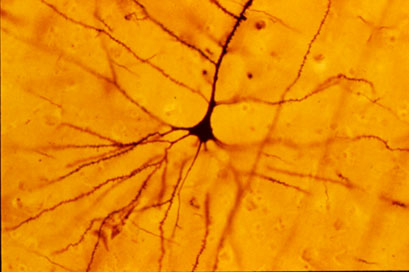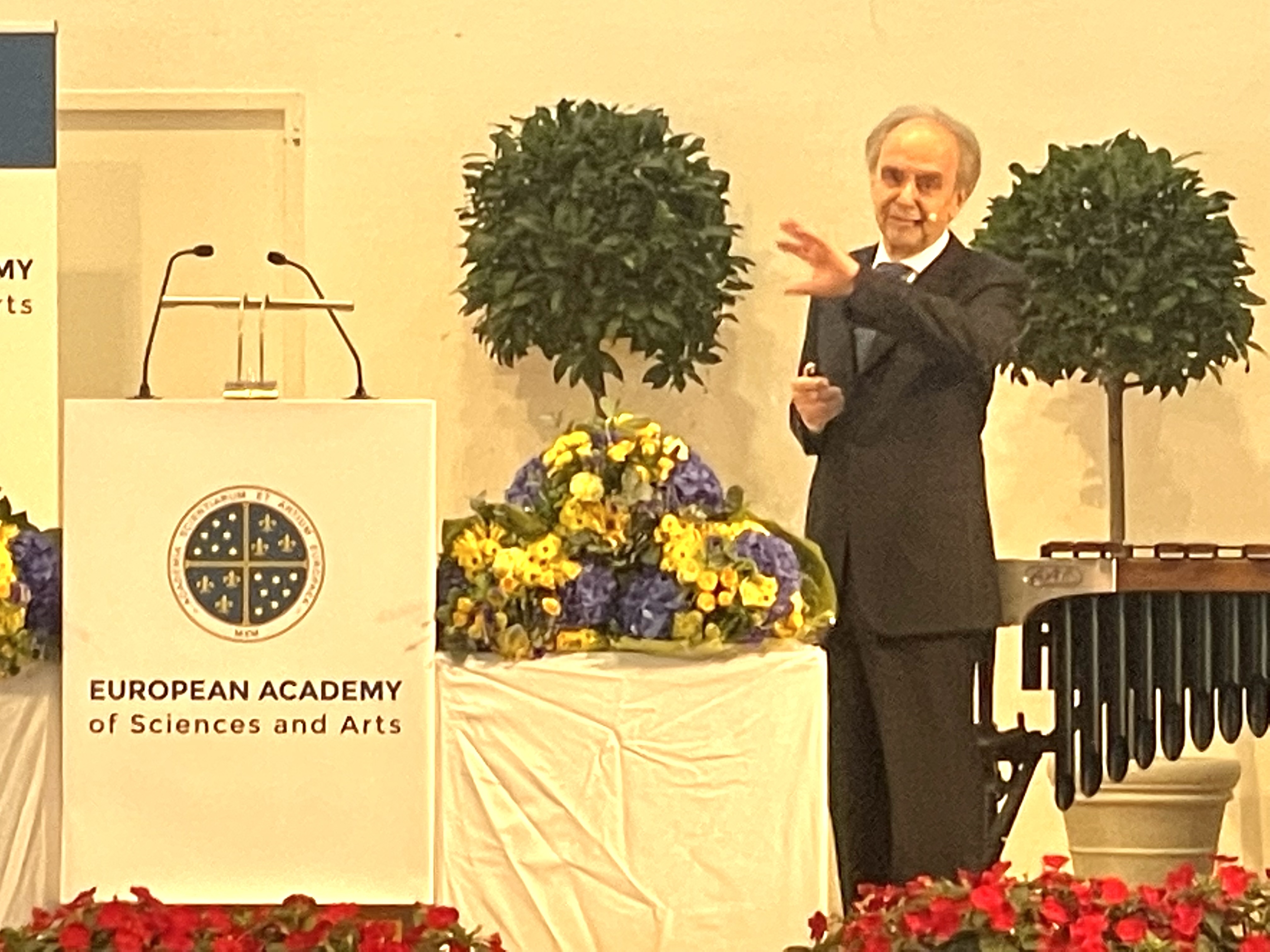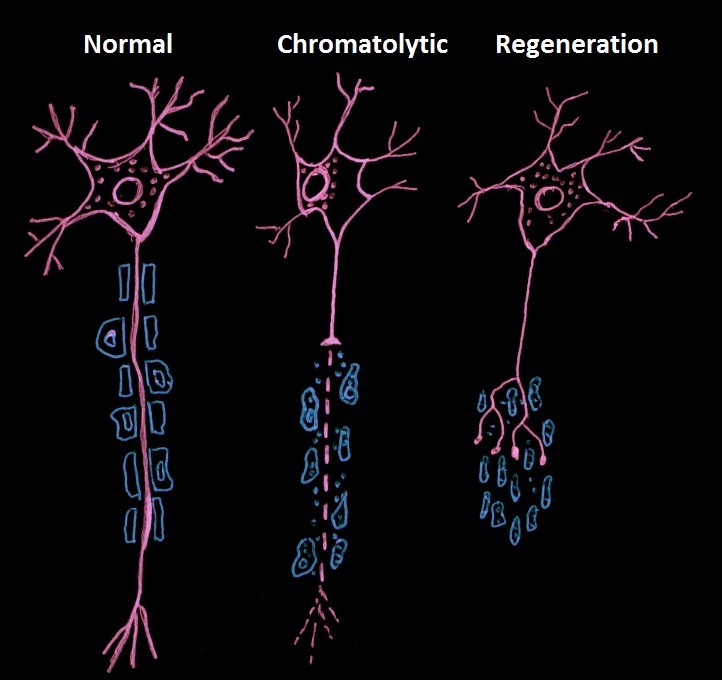|
Georg Kreutzberg
Georg W. Kreutzberg (September 2, 1932 – March 20, 2019) was a German neuromorphologist. Kreutzberg was long-serving director at the Max Planck Institute of Neurobiology in Martinsried near Munich. He remained active as emeritus director at that institute. His various research interests have included microglia cells, neuropathology and nerve regeneration following trauma (especially paraplegia and quadriplegia), fraud in science, correct reporting of scientific research to laypeople and the history of neuroscience in Germany. Biography Kreutzberg was born in Ahrweiler. He studied medicine, later specializing in Neuropathology, at the Rheinische Friedrich-Wilhelms-University in Bonn, the Albert Ludwig's University in Freiburg, the Medical University in Innsbruck and the University of Vienna. In 1961 he graduated as doctor from the University of Freiburg in Breisgau. After working as post-doctoral scientific assistant, first at the Max Planck Institute of Psychiatry in Munic ... [...More Info...] [...Related Items...] OR: [Wikipedia] [Google] [Baidu] |
Neuromorphology
Neuromorphology (from Greek νεῦρον, neuron, "nerve"; μορφή, morphé, "form"; -λογία, -logia, “study of”) is the study of nervous system form, shape, and structure. The study involves looking at a particular part of the nervous system from a molecular and cellular level and connecting it to a physiological and anatomical point of view. The field also explores the communications and interactions within and between each specialized section of the nervous system. Morphology is distinct from morphogenesis. Morphology is the study of the shape and structure of biological organisms, while morphogenesis is the study of the biological development of the shape and structure of organisms. Therefore, neuromorphology focuses on the specifics of the structure of the nervous system and not the process by which the structure was developed. Neuromorphology and morphogenesis, while two different entities, are nonetheless closely linked. History Progress in defining the morph ... [...More Info...] [...Related Items...] OR: [Wikipedia] [Google] [Baidu] |
Academia Scientiarum Et Artium Europaea
The European Academy of Sciences and Arts (EASA, la, Academia Scientiarum et Artium Europaea) is a transnational and interdisciplinary network, connecting about 2,000 recommended scientists and artists worldwide, including 37 Nobel Prize laureates. The European Academy of Sciences and Arts is a learned society of scientists and artists, founded by Felix Unger. The academy was founded 1990, is situated in Salzburg and has been supported by the city of Vienna, the government of Austria, and the European Commission. The EASA is now headed by President Klaus Mainzer, TUM Emeritus of Excellence at the Technical University of Munich and Senior Professor at the Carl Friedrich von Weizsäcker Center of the University of Tübingen. It is unrelated to and should not be confused with a different, highly controversial, and less well-established academy, the Belgium-based European Academy of Sciences. It is a member of the InterAcademy Partnership. Its activities have included a collabora ... [...More Info...] [...Related Items...] OR: [Wikipedia] [Google] [Baidu] |
Academic Staff Of The Technical University Of Munich
An academy (Attic Greek: Ἀκαδήμεια; Koine Greek Ἀκαδημία) is an institution of secondary or tertiary higher learning (and generally also research or honorary membership). The name traces back to Plato's school of philosophy, founded approximately 385 BC at Akademia, a sanctuary of Athena, the goddess of wisdom and skill, north of Athens, Greece. Etymology The word comes from the ''Academy'' in ancient Greece, which derives from the Athenian hero, ''Akademos''. Outside the city walls of Athens, the gymnasium was made famous by Plato as a center of learning. The sacred space, dedicated to the goddess of wisdom, Athena, had formerly been an olive grove, hence the expression "the groves of Academe". In these gardens, the philosopher Plato conversed with followers. Plato developed his sessions into a method of teaching philosophy and in 387 BC, established what is known today as the Old Academy. By extension, ''academia'' has come to mean the accumulation, dev ... [...More Info...] [...Related Items...] OR: [Wikipedia] [Google] [Baidu] |
Members Of The European Academy Of Sciences And Arts
Member may refer to: * Military jury, referred to as "Members" in military jargon * Element (mathematics), an object that belongs to a mathematical set * In object-oriented programming, a member of a class ** Field (computer science), entries in a database ** Member variable, a variable that is associated with a specific object * Limb (anatomy), an appendage of the human or animal body ** Euphemism for penis * Structural component of a truss, connected by nodes * User (computing), a person making use of a computing service, especially on the Internet * Member (geology), a component of a geological formation * Member of parliament * The Members, a British punk rock band * Meronymy, a semantic relationship in linguistics * Church membership, belonging to a local Christian congregation, a Christian denomination and the universal Church * Member, a participant in a club or learned society A learned society (; also learned academy, scholarly society, or academic association) is an ... [...More Info...] [...Related Items...] OR: [Wikipedia] [Google] [Baidu] |
Officers Crosses Of The Order Of Merit Of The Federal Republic Of Germany
An officer is a person who has a position of authority in a hierarchical organization. The term derives from Old French ''oficier'' "officer, official" (early 14c., Modern French ''officier''), from Medieval Latin ''officiarius'' "an officer," from Latin ''officium'' "a service, a duty" the late Latin from ''officiarius'', meaning "official." Examples Ceremonial and other contexts *Officer, and/or Grand Officer, are both a grade, class, or rank of within certain chivalric orders and orders of merit, e.g. Legion of Honour (France), Order of the Holy Sepulchre (Holy See), Order of the British Empire ( UK), Order of Leopold (Belgium) *Great Officer of State *Merchant marine officer or licensed mariner *Officer of arms * Officer in The Salvation Army, and other state decorations Corporations * Bank officer *Corporate officer, a corporate title **Chief executive officer (CEO) **Chief financial officer (CFO) **Chief operating officer (COO) *Executive officer Education *Chief academic ... [...More Info...] [...Related Items...] OR: [Wikipedia] [Google] [Baidu] |
German Neuroscientists
German(s) may refer to: * Germany (of or related to) **Germania (historical use) * Germans, citizens of Germany, people of German ancestry, or native speakers of the German language ** For citizens of Germany, see also German nationality law **Germanic peoples (Roman times) * German language **any of the Germanic languages * German cuisine, traditional foods of Germany People * German (given name) * German (surname) * Germán, a Spanish name Places * German (parish), Isle of Man * German, Albania, or Gërmej * German, Bulgaria * German, Iran * German, North Macedonia * German, New York, U.S. * Agios Germanos, Greece Other uses * German (mythology), a South Slavic mythological being * Germans (band), a Canadian rock band * "German" (song), a 2019 song by No Money Enterprise * ''The German'', a 2008 short film * "The Germans", an episode of ''Fawlty Towers'' * ''The German'', a nickname for Congolese rebel André Kisase Ngandu See also * Germanic (other) * Germa ... [...More Info...] [...Related Items...] OR: [Wikipedia] [Google] [Baidu] |
2019 Deaths
This is a list of deaths of notable people, organised by year. New deaths articles are added to their respective month (e.g., Deaths in ) and then linked here. 2022 2021 2020 2019 2018 2017 2016 2015 2014 2013 2012 2011 2010 2009 2008 2007 2006 2005 2004 2003 2002 2001 2000 1999 1998 1997 1996 1995 1994 1993 1992 1991 1990 1989 1988 1987 See also * Lists of deaths by day The following pages, corresponding to the Gregorian calendar, list the historical events, births, deaths, and holidays and observances of the specified day of the year: Footnotes See also * Leap year * List of calendars * List of non-standard ... * Deaths by year {{DEFAULTSORT:deaths by year ... [...More Info...] [...Related Items...] OR: [Wikipedia] [Google] [Baidu] |
1932 Births
Year 193 ( CXCIII) was a common year starting on Monday (link will display the full calendar) of the Julian calendar. At the time, it was known as the Year of the Consulship of Sosius and Ericius (or, less frequently, year 946 ''Ab urbe condita''). The denomination 193 for this year has been used since the early medieval period, when the Anno Domini calendar era became the prevalent method in Europe for naming years. Events By place Roman Empire * January 1 – Year of the Five Emperors: The Roman Senate chooses Publius Helvius Pertinax, against his will, to succeed the late Commodus as Emperor. Pertinax is forced to reorganize the handling of finances, which were wrecked under Commodus, to reestablish discipline in the Roman army, and to suspend the food programs established by Trajan, provoking the ire of the Praetorian Guard. * March 28 – Pertinax is assassinated by members of the Praetorian Guard, who storm the imperial palace. The Empire is auctioned off ... [...More Info...] [...Related Items...] OR: [Wikipedia] [Google] [Baidu] |
Bundesverdienstkreuz
The Order of Merit of the Federal Republic of Germany (german: Verdienstorden der Bundesrepublik Deutschland, or , BVO) is the only federal decoration of Germany. It is awarded for special achievements in political, economic, cultural, intellectual or honorary fields. It was created by the first President of the Federal Republic of Germany, Theodor Heuss, on 7 September 1951. Colloquially, the decorations of the different classes of the Order are also known as the Federal Cross of Merit (). It has been awarded to over 200,000 individuals in total, both Germans and foreigners. Since the 1990s, the number of annual awards has declined from over 4,000, first to around 2,300–2,500 per year, and now under 2,000, with a low of 1752 in 2011. Since 2013, women have made up a steady 30–35% of recipients. Most of the German federal states (''Länder'') have each their own order of merit as well, with the exception of the Free and Hanseatic Cities of Bremen and Hamburg, which reject ... [...More Info...] [...Related Items...] OR: [Wikipedia] [Google] [Baidu] |
Albert Szent-Györgyi Medical University
Albert Szent-Györgyi Medical University was originally established in Kolozsvár, then in Austria-Hungary, later Romania, in 1872. After World War I, it was moved to Szeged. Since 1921 great advances have been made in the development of the University. Most of the University buildings have preserved their original, harmonized style, providing a true University atmosphere of tradition. Setting and architecture Preclinical departments of the Faculty of Medicine are situated around Cathedral (''Dóm'') Square. The University Hospitals, housing the clinical departments, occupy the land between the Cathedral and River Tisza, which is a calm, peaceful area of the old town. Some of the preclinical departments are accommodated in other buildings; however, even off-campus departments of the Medical University (such as Anatomy and Forensic Medicine) are within easy access from the city center (10 minutes by tram). Notable professors Many notable professors have been members of the fa ... [...More Info...] [...Related Items...] OR: [Wikipedia] [Google] [Baidu] |
Axotomy
An axotomy is the cutting or otherwise severing of an axon. Derived from axo- (=axon) and -tomy (=surgery). This type of denervation is often used in experimental studies on neuronal physiology and neuronal death or survival as a method to better understand nervous system diseases. Axotomy may cause neuronal cell death, especially in embryonic or neonatal animals, as this is the period in which neurons are dependent on their targets for the supply of survival factors. In mature animals, where survival factors are derived locally or via autocrine loops, axotomy of peripheral neurons and motoneurons can lead to a robust regenerative response without any neuronal death. In both cases, autophagy is observed to markedly increase. Autophagy could either clear the way for neuronal degeneration or it could be a medium for cell destruction.Rubinsztein DC et al. (2005) Autophagy and Its Possible Roles in Nervous System Diseases, Damage and Repair. Autophagy 1(1):11-22. __TOC__ Axotomy resp ... [...More Info...] [...Related Items...] OR: [Wikipedia] [Google] [Baidu] |
Facial Motor Nucleus
The facial motor nucleus is a collection of neurons in the brainstem that belong to the facial nerve ( cranial nerve VII). These lower motor neurons innervate the muscles of facial expression and the stapedius. Structure The nucleus is situated in the caudal portion of the ventrolateral pontine tegmentum. Its axons take an unusual course, traveling dorsally and looping around the abducens nucleus, then traveling ventrally to exit the ventral pons medial to the spinal trigeminal nucleus. These axons form the motor component of the facial nerve, with parasympathetic and sensory components forming the intermediate nerve. The nucleus has a dorsal and ventral region, with neurons in the dorsal region innervating muscles of the upper face and neurons in the ventral region innervating muscles of the lower face. Function Because it innervates muscles derived from pharyngeal arches, the facial motor nucleus is considered part of the special visceral efferent (SVE) cell column, whic ... [...More Info...] [...Related Items...] OR: [Wikipedia] [Google] [Baidu] |





